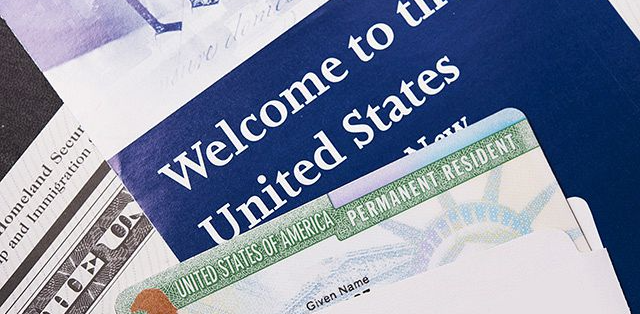Ajustement du statut sur la base d'un mariage avec un Citoyen Américain,Pour les enfants mineurs ou les parents de Citoyens Américains
Ajustement du statut sur la base d'un mariage avec un Citoyen Américain,
Pour les enfants mineurs ou les parents de Citoyens Américains
L'ajustement du statut est la procédure que vous pouvez utiliser pour demander le statut de résident permanent légal (également connu sous le nom de demande de carte verte) lorsque vous êtes présent aux États-Unis. Cela signifie que vous pouvez obtenir une carte verte sans avoir à retourner dans votre pays d'origine pour accomplir les formalités de visa.
Nos avocats spécialisés en droit de l'immigration ont une grande expérience dans ce domaine et peuvent vous garantir une représentation juridique compétente et efficace pour l'obtention de votre visa de non-immigrant légal. Prenez rendez-vous en ligne (consultations en personne ou par téléphone) pour en savoir plus sur la façon dont vous pouvez obtenir votre visa de non-immigrant et investir aux Etats-Unis.
Questions
Pour toute question supplémentaire, vous pouvez contacter notre bureau en prenant rendez-vous
avec nous.
Articles Du Blog
Articles Du Blog

par Denice Flores
•
04 avr., 2024
Advance parole is a travel document that permits you to travel outside the United States for temporary travel and return to the United States . Applicants for advance parole need to file Form I-131, Application for Travel Document with U.S. Citizenship and Immigration Services (USCIS) and pay the filing fee. When the application is approved, USCIS issues the applicant a Form I-512L, the advance parole document. The document must be presented to immigration officials to seek admission into the United States after traveling abroad. There are several ways a person can qualify for and obtain advance parole. Applicants for adjustment of status, DACA recipients, and individuals who need to travel for urgent humanitarian reasons are three common types of applicants that can apply for advance parole , however there are more. Applicants for adjustment of status can apply for advance parole when they file their green card application or when the green card application is pending. Adjustment of status applicants must obtain advance parole before traveling outside the United States to avoid an issue with the green card application. Obtaining advance parole through an adjustment of status application does not require an emergency or humanitarian purpose for travel. Note, when you file for advance parole through an adjustment of status application the filing fee for Form I-131 is not required. DACA recipients may also apply for advance parole to travel abroad for humanitarian reasons or for employment or educational purposes only. Humanitarian reasons include medical attention or treatment, visiting a sick relative or for a relative’s funeral services. Educational purposes include studying abroad, academic research and more. Employment purposes include work, training, meetings, interviews, and other specific work assignments. Certain individuals may also apply for advance parole due to an urgent humanitarian reason or to further a significant public benefit. To show that the travel is due to humanitarian, education, or employment reasons, the applicant must provide proof of such to USCIS. As mentioned, these are the three most common ways to obtain advance parole, but they are not the only ways. If you have questions about other ways to obtain advance parole, if you think you qualify for advance parole or have questions about your eligibility, please schedule a consultation with one of our experienced attorneys and we will be more than happy to assist you.

par Denice Flores
•
02 mars, 2023
Your conditional resident status is only valid for 2 years. In order to prevent losing lawful status in the United States, you must submit Form I-751, Petition to Remove Conditions on Residence, 90 days before your conditional green card expires. It is critical that you file Form I-751 to remove the conditions in a timely manner because if it is not, you may risk being left without status and the U.S. Department of Homeland Security may issue you a Notice to Appear and place you in removal proceedings before an Immigration Judge.



